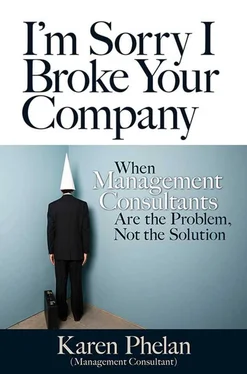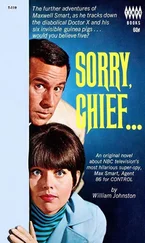Karen Phelan - I'm Sorry I broke Your Company
Здесь есть возможность читать онлайн «Karen Phelan - I'm Sorry I broke Your Company» весь текст электронной книги совершенно бесплатно (целиком полную версию без сокращений). В некоторых случаях можно слушать аудио, скачать через торрент в формате fb2 и присутствует краткое содержание. Город: San Francisco, Год выпуска: 2013, ISBN: 2013, Издательство: Berrett-Koehler Publishers, Жанр: management, popular_business, на английском языке. Описание произведения, (предисловие) а так же отзывы посетителей доступны на портале библиотеки ЛибКат.
- Название:I'm Sorry I broke Your Company
- Автор:
- Издательство:Berrett-Koehler Publishers
- Жанр:
- Год:2013
- Город:San Francisco
- ISBN:978-1-60994-740-8; 978-1-60994-741-5
- Рейтинг книги:3 / 5. Голосов: 1
-
Избранное:Добавить в избранное
- Отзывы:
-
Ваша оценка:
- 60
- 1
- 2
- 3
- 4
- 5
I'm Sorry I broke Your Company: краткое содержание, описание и аннотация
Предлагаем к чтению аннотацию, описание, краткое содержание или предисловие (зависит от того, что написал сам автор книги «I'm Sorry I broke Your Company»). Если вы не нашли необходимую информацию о книге — напишите в комментариях, мы постараемся отыскать её.
I'm Sorry I broke Your Company — читать онлайн бесплатно полную книгу (весь текст) целиком
Ниже представлен текст книги, разбитый по страницам. Система сохранения места последней прочитанной страницы, позволяет с удобством читать онлайн бесплатно книгу «I'm Sorry I broke Your Company», без необходимости каждый раз заново искать на чём Вы остановились. Поставьте закладку, и сможете в любой момент перейти на страницу, на которой закончили чтение.
Интервал:
Закладка:
To summarize, the current state of strategy development and execution is this:
1. Predict the future.
2. Define an audacious stretch goal based on that prediction.
3. Persuade other, more pragmatic people, who weren't involved in creating the goal and who typically need their monthly salaries, to work toward it.
4. Work on nothing else.
5. Celebrate success!
Are you laughing or are you crying? I mean, it is pretty funny except for being so sad. Companies go bankrupt and people lose their jobs because of this thinking. Even funnier is that neither Porter, Prahalad, Hamel, Welch, nor BCG or any of the other strategy houses devised this process. It is the collective sum of the thinking around strategy, and in this case, the sum is much, much less than the parts. Obviously, this is not the right way to plan the future of a company.
Lets go back to the beginning, before Porter and everyone else. The basis for corporate strategy development was warfare; thats where the term «strategy» came from. Porters book is full of warfare terminology such as «competitive warfare,» «defensive moves,» «retaliation,» and «fighting brand» and assumes that a company needs to beat It's competition to win. Although I don’t agree that corporations need to engage in battle to succeed, I do want to understand how warfare theory can contribute to business strategy.
Back in the ’80s, some of the other popular books on strategy were treatises on war, like Sun Tzu’s Art of War . I don’t particularly care for this book because it’s a listing of aphorisms, and it’s over two thousand years old. The book I chose to teach me about battle strategy was Ulysses S. Grant’s personal memoirs, considered to be one of the best accounts of war. When Grant describes the Civil War battles, most of his description is devoted to explaining the lay of the land. The book contains numerous hand drawn maps of the battlefields. He studied the land fastidiously to determine where to position his men and how to orchestrate a battle. As the battle took place, he usually had to abandon his original plan, but knowing the lay of the land helped him devise a new course of action. This, plus his attention to logistics and supply, is how Grant won the Civil War.
Another famous, winning general was Dwight D. Eisenhower. I often refer to one of his famous quotes, «In preparing for battle I have always found that plans are useless, but planning is indispensable.» Battles rarely go according to plan. Neither does life. Needless to say, businesses rarely proceed according to plan either.
The problem is that people have been sold on the strategic plan as the answer. The plan itself has very little value. As our famous military generals advised, it is the planning that adds the value. Learning about trends, economic scenarios, competitors' strengths and weaknesses, regulatory changes, and consumer feedback adds insight and wisdom to a company's decision making. With this knowledge, businesses are better able to react to situations and recognize good opportunities. Planning expands thinking while following a plan limits thinking. And the whole point of developing a strategy is to improve intelligence, not replace it! Exacerbating the problem, most companies use consultants to do the analyses and develop the plans, and all that knowledge walks out the door when the consultants are done. Instead of insight built within the company, what's left behind is a seventy-five-page PowerPoint document that few read, let alone comprehend, and that becomes obsolete almost as soon as it's printed. There is a huge difference in what you learn from spending weeks doing an analysis, documenting findings, and formulating conclusions and what you get from reading a report.
The goal of strategy development should not be a plan. Strategy development is actually a vision quest. Vision quests are not attempts to predict the future or create a plan of action but are acts of self-discovery. Strategy development should be an act of corporate self-discovery. Hence, the value of developing strategy is not in the paper document left behind. You can probably throw that away. The value is in the learning and discovery process. The goal shouldn't be to develop a plan to follow but to gain the wisdom to react appropriately to a rapidly changing world given the capabilities of the company. This way, when opportunities present themselves, employees can distinguish the good ones from the not-so-good ones. The problem with a plan is that it can never account for all the unplanned opportunities that will arise. And some of those unplanned opportunities will be the key to succeeding in the future. Businesses don’t succeed by predicting the future and dictating the marketplace; they succeed by recognizing good opportunities and pursuing them, especially when no one else does. This is how Microsoft, Apple, and Google became market leaders, not by predicting the future, but by recognizing and seizing upon good opportunities. Logically, then, the best way to succeed is to persuade your competitors to develop and execute strategic plans while you just keep your eyes open for good opportunities.
To choose good opportunities, corporate discovery needs to include as many people as feasible. A company is the sum of It's people, and how do you discover who you are if you include only the head but not the heart and soul? Most companies develop their strategies with a select few, usually the leadership team, who aren't close to customers or competitors or trends. This is how blockbuster drugs and total business transformation become strategic goals. In contrast, military leaders are constantly gathering intelligence from the field. Similarly, employees can provide a wealth of intelligence about the marketplace, customers, and even competitors — someone has probably worked there. Sharing information throughout the organization about the company's values and capabilities, projects that worked and didn't work, what customers want, and emerging technologies is all critical to good decision making. People need to know these to recognize good opportunities. This is what strategy development is really about — providing the foundation for making informed decisions. It is not about a few people making those decisions in advance.
We need to think about corporate strategy in realistic terms. Not everyone can be the market leader. Not all businesses will grow at double-digit rates or be the stars. Predicting the future is pretty much impossible even for the smartest people in the world and certainly impossible for a bunch of twenty-something-year-old consultants. However, discovering a purpose and creating the wisdom needed to make decisions about unexpected events is foolproof in comparison.
2
Make Sure You Reengineer the People, Too
Optimized Processes Only Look Good on Paper
Process reengineering, and with it, process automation, is where I've spent a good chunk of my career. This was the type of work I did when I began consulting, only we called it «operations improvements» before the term «process reengineering» was coined. Although my memories of many client projects all those years ago are a blur, I do remember my first client engagement well because it taught me a great deal about business problems. The client was a small refrigerator manufacturer that was suffering from excess inventory, long lead times, and an inability to meet customer orders. The business had changed over the years from just a few products to a wide-ranging product line that offered customers their choice of features and even some custom designs. The complexity of the operations had increased while the plant configuration had stayed the same. My manager had sold the client very expensive, cutting-edge software to improve It's scheduling ability, a large investment for a company of this size. He had promised the software would optimize the company’s plant floor and dramatically improve It's production volume. Unfortunately, after following his advice and implementing the software, the company saw only slight improvements. This became a big client satisfaction issue, especially because the company was a client of other services our consulting firm offered, and the partner in charge of the manufacturing practice had to fly out and try to smooth the situation over. The result was that my manager was effectively banned from the client’s site, and we offered to perform a free analysis of the company’s operations and write a requirements definition for an integrated manufacturing, inventory, and financial information system. Eventually, this system would solve the company’s problems because it would integrate It's operations.
Читать дальшеИнтервал:
Закладка:
Похожие книги на «I'm Sorry I broke Your Company»
Представляем Вашему вниманию похожие книги на «I'm Sorry I broke Your Company» списком для выбора. Мы отобрали схожую по названию и смыслу литературу в надежде предоставить читателям больше вариантов отыскать новые, интересные, ещё непрочитанные произведения.
Обсуждение, отзывы о книге «I'm Sorry I broke Your Company» и просто собственные мнения читателей. Оставьте ваши комментарии, напишите, что Вы думаете о произведении, его смысле или главных героях. Укажите что конкретно понравилось, а что нет, и почему Вы так считаете.












